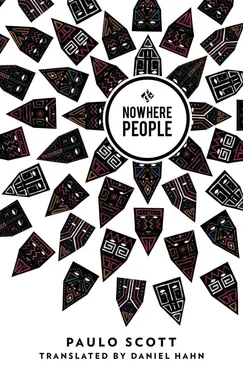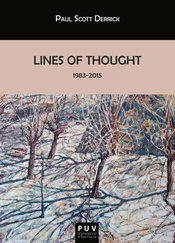Paulo Scott - Nowhere People
Здесь есть возможность читать онлайн «Paulo Scott - Nowhere People» весь текст электронной книги совершенно бесплатно (целиком полную версию без сокращений). В некоторых случаях можно слушать аудио, скачать через торрент в формате fb2 и присутствует краткое содержание. Год выпуска: 2014, Издательство: And Other Stories Publishing, Жанр: Современная проза, на английском языке. Описание произведения, (предисловие) а так же отзывы посетителей доступны на портале библиотеки ЛибКат.
- Название:Nowhere People
- Автор:
- Издательство:And Other Stories Publishing
- Жанр:
- Год:2014
- ISBN:нет данных
- Рейтинг книги:3 / 5. Голосов: 1
-
Избранное:Добавить в избранное
- Отзывы:
-
Ваша оценка:
- 60
- 1
- 2
- 3
- 4
- 5
Nowhere People: краткое содержание, описание и аннотация
Предлагаем к чтению аннотацию, описание, краткое содержание или предисловие (зависит от того, что написал сам автор книги «Nowhere People»). Если вы не нашли необходимую информацию о книге — напишите в комментариях, мы постараемся отыскать её.
Driving home, law student Paulo passes a figure at the side of the road. The indigenous girl stands in the heavy rain, as if waiting for something. Paulo gives her a lift to her family’s roadside camp.
With sudden shifts in the characters’ lives, this novel takes in the whole story: telling of love, loss and family, it spans the worlds of São Paulo’s rich kids and dispossessed Guarani Indians along Brazil’s highways. One man escapes into an immigrant squatter’s life in London, while another’s performance activism leads to unexpected fame on Youtube.
Written from the gut, it is a raw and passionate classic in the making, about our need for a home.
Nowhere People — читать онлайн бесплатно полную книгу (весь текст) целиком
Ниже представлен текст книги, разбитый по страницам. Система сохранения места последней прочитанной страницы, позволяет с удобством читать онлайн бесплатно книгу «Nowhere People», без необходимости каждый раз заново искать на чём Вы остановились. Поставьте закладку, и сможете в любой момент перейти на страницу, на которой закончили чтение.
Интервал:
Закладка:
He is staring at the bloodstain on the white sheet. He awoke agitated, like she’d never seen him before, said that he was going out for a run and would be back in an hour at the most. She did not reply, she just stayed there, still, on the single bed. Alone in the house. She needs some thought, she needs some reaction, because the satisfaction she’s feeling is huge and reckless and solid (she feels ready, fortunate, she took in the night before, the mingled smells between the two of them, the new texture clinging to her skin). The minutes pass quickly. Paulo comes back (it’s very possible that he exercised for less time than he had promised). Maína is in the same position. He lies down in front of her, he says they need to tidy up the house, his parents will be arriving in the evening. Maína gets up, takes him by the hand, they walk to the bathroom. She steps into the shower cubicle, he turns on the taps, regulates the water temperature, takes off his clothes. The warmth is pleasant, it replaces their perspiration. She takes his index finger with one of her hands and his forearm with the other, repositions him (positions herself), and puts Paulo’s finger inside, tries not to think about the day when last night’s luck will run out on them.
Eleven-thirty in the morning. Silently Maína is tidying herself up (and even when he hands her the Polaroid photo of the two of them wearing the clothes she had created, suggesting that she tape it to one of the pages of her exercise book, she still feels awkward). The house is in order. He says he’ll take her to the encampment. They drive away, up the road towards Bento Gonçalves and then out of the city. At the end of the Castelo Branco expressway, not long before the exit to the slope that leads onto the bridge, he pulls the Beetle over, asks if she wants to stay with him for one more day. Looking straight ahead, Maína accepts with a nod. Paulo keeps on going towards the state’s northern seaboard. He makes a few amusing comments but, though she looks at him alertly, she does not smile. Almost at the end of the journey they come to the stretch near the Barros lagoon, its expanse made up of water that comes down from the mountains, he pulls into a lay-by, gets out of the car, stands there taking in the north-eastern wind that is blowing hard on his face. She gets out of the Beetle and, finding the smell of the sea curious (not knowing it), she lightly touches Paulo’s waist and then puts her arms around him. ‘Ok, Maína?’ he asks, not turning round. ‘It should have passed, but is stronger now,’ she says, drily. The lagoon is filled with ghosts, that’s what his parents would tell him when the four of them used to drive past in the brown Volkswagen Brasilia towards their old summer house on Capão da Canoa Beach, his parents always in a hurry, always right on time — close up the house in town, get into the car, don’t stop till you’re outside the beach house. This haste to do things (and reach places) is supreme in Paulo. This is the first time in his life he’s had the patience to stop the car and look out at all that water, standing there wrapped in the arms of this girl who had also spooked him one day. ‘For me, too,’ he replies, and invites her to sit on the low concrete wall. She runs over to the car, gets a little jacket that used to belong to her older sister, in one of the pockets is the Polaroid picture, then comes back and settles herself beside him. Legs swinging in the air, Paulo’s moving less than hers. Maína puts her hand in the jacket pocket, takes out the photo and only then looks at the result, noticing something he already knew: though the composition was good, the picture was out of focus.
In Tramandaí, counting on finding one of his friends who might offer them shelter for a night; at the first attempt Paulo finds Leonardo, who moved to the coast to prepare for the exam to be a public prosecutor. Sitting on the porch of his parents’ bungalow, engrossed in a book on criminal procedure, Leonardo is startled when the car comes up his drive. ‘Hi, Leo,’ Paulo greets him. ‘Paulo Guevara and his surprises,’ says Leonardo. ‘I figured you’d have committed body and soul to the Lula campaign by now,’ he teases. ‘Some things have changed in the last few months.’ Leonardo looks at Maína suspiciously. ‘Evening, miss,’ he said. ‘Good evening,’ comes Maína’s intimidated reply. He gets straight to the point, ‘I need somewhere to stay tonight, Leo. Any chance of staying here in the guest room?’ ‘Of course, make yourself at home. You know the way, take your things and sort yourselves out up there … If you need an extra bed, there’s a fold-up there in the … ’ And Paulo interrupts him. ‘No, no need.’ Leonardo picks up his book again. ‘Right. I’ve got to finish up a few pages here now. We’ll catch up on news at dinner time … We can go to a really cool pizza place that opened recently.’ Paulo takes Maína’s things, leaves the car just where it is. They go in by the back door. In the bedroom there’s no sheet on the mattress. Paulo looks in the cupboards and doesn’t find anything. Maína looks under the bed; Paulo, laughing, says they’re not likely to be there. He’ll leave it, they can ask later, he doesn’t want to bother Leonardo any more, he knows how much he’s been devoting himself to passing these exams since the start of the year. They go down to the kitchen, Paulo pours out two glasses of milk, takes the packet of Tip Top biscuits from the basket on the table. Straight afterwards he washes up what they’ve dirtied (one of the reasons he’s welcomed by Leonardo is that he has never taken advantage of his position as a guest). They go out for a walk along the beach. Though it’s nearly five in the afternoon, the sun is still strong, with that punishing north-easterly wind. There are two boys flying kites on the walkway which was damaged by some recent rough seas; there’s a big plastic bag, opaque but quite see-through, with seven others inside it and a piece of paper on the outside announcing that the kites are for sale. One is blue and the other is red, they are the same size and design but it’s the red that has completely caught Maína’s attention, she no longer has eyes for anything else around her. Having expected her to be thrilled by the sight of the sea, Paulo notices this and is annoyed; up till now her only question has been about the fishing platform: she wanted to know what that thing was that was going into the sea. He explained, she said nothing. They walk over to the boys. Maína asks if Paulo can buy the red one that’s flying (it’s the first time Maína has asked him to buy anything; Paulo thinks, something has changed ). Paulo fulfils her wishes. Maína reels in the kite and stows it under her arm. They stay till after it gets dark. On the way back, Paulo asks her if she liked the sea. ‘The sound of the waves and also the waves,’ she says, and they turn right onto Leonardo’s street.
Sharing a bottle of beer with Paulo on the porch, Leonardo takes advantage of Maína’s being in the bathroom to ask if Paulo knows what he’s doing. ‘Wake up, Paulo, the girl isn’t only a kid, she’s also an Indian … I don’t have to explain to you how much that makes this whole thing a huge bloody chainsaw massacre,’ and he looks at his friend, whom he has known since he was ten years old and Paulo eight, feeling as though, in spite of the mutual admiration that still exists, there’s no longer the affinity that survived up to their university days. Paulo, who just said again and again that there was no need to worry, seems to be looking out into nothingness. ‘All right, Paulo?’ Leonardo asks, crossing a line he’s sure his friend won’t like him crossing. ‘Huh? Whatever it is, get it off your chest … ’ and he puts his hand on Paulo’s shoulder. ‘Something happened yesterday … ’ Paulo says, but he doesn’t go on. Leonardo won’t press him. His old classmate is a grown-up, more mature than most of his age can manage. Even a poor bastard down on his knees begging to be put in jail, even he deserves the benefit of the doubt, he must know what he’s doing, there has to be some reason. He picks up the bottle from the tiled floor, refills his glass and then his guest’s. ‘And the degree, Paulo, how’s that going?’ he says, trying to resume the thread of the conversation. Paulo takes a gulp of the drink, grimaces slightly. ‘I think I’m going to drop out,’ he looks at him, seriously. ‘I haven’t decided yet, but if it happens it’ll be now, at the end of this term.’ Leonardo can’t help himself. ‘You never took that course seriously.’ Talking about the course is allowed, it’s an area that can be freely scrutinised. ‘Law’s a big lie, Leo, we both know that. You did your entire course reading a Federal Constitution that was shoved down our throats by the military,’ he says, and pours out what was left of the beer in his glass. ‘This Serramalte of yours is warm.’ Leonardo is not discouraged (Leonardo is never discouraged). ‘It is. I put it in the fridge when you two went out.’ And he teases: ‘I’ll let you buy me a colder one at the pizza place.’ Paulo goes back to looking into nothingness. ‘Another reason to devote ourselves to trying to make things better,’ argues Leonardo. ‘But turning into a well-meaning little prosecutor just to legitimise the power … the power of … ’ and he realises that he has fallen into his friend’s trap. ‘Just let it go.’ Leonardo laughs. ‘You know what I find most fascinating, Paulo? It’s that the good people, the most credulous and well-intentioned people, they’re exactly the ones who give up,’ and he gets up to carry the glasses and the bottle off to the kitchen. ‘It must be the particularly acute sensibility you people have, that poetic soul of yours.’ Paulo takes hold of his arm. ‘Tell me, Leo,’ looking upset, ‘what kind of prosecutor do you want to be?’ And Maína appears on the veranda, on the side Leonardo was headed. The conversation between the two friends ends there: Leonardo understands Paulo’s innate difficulty in taking things less seriously and not getting deeply involved in all of it. He always reacts. It’s what makes Leonardo admire him so much, and sympathise, too; he can see his friend’s premature frustration, he doesn’t like seeing him suffer. ‘Let’s go in my Uno. I need to get the battery going, but this means the drinks are definitely on you.’ Paulo agrees with a smile, a little ashamed. Maína approaches. Leonardo walks over to the kitchen, he’s worried about this all-or-nothing situation but, just the same, (believing he can better understand it) glad to see his old friend again.
Читать дальшеИнтервал:
Закладка:
Похожие книги на «Nowhere People»
Представляем Вашему вниманию похожие книги на «Nowhere People» списком для выбора. Мы отобрали схожую по названию и смыслу литературу в надежде предоставить читателям больше вариантов отыскать новые, интересные, ещё непрочитанные произведения.
Обсуждение, отзывы о книге «Nowhere People» и просто собственные мнения читателей. Оставьте ваши комментарии, напишите, что Вы думаете о произведении, его смысле или главных героях. Укажите что конкретно понравилось, а что нет, и почему Вы так считаете.












